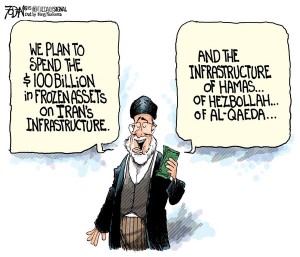When I read the headline, “Iran Does Billions in Business in Europe,” in Tuesday morning’s Wall Street Journal, of course I was reminded of those same billions we released as part of the flawed nuclear deal fashioned by the Obama administration.
In addition to an account of spending with European companies, there was a mention of Iranian President Hassan Rouhani’s side visit to the Vatican.
The talking heads on TV were musing that perhaps it meant that Iran was finally preparing to become a member of the global community. No chance.
But this news triggered the recollection of another piece on Iran published in the Jan. 23-24, 2016 WSJ, “The Two Faces Of Iran’s Dual Government,” a look inside of Iran’s power structure that should caution the free world as Iran seeks to win friends through billions of dollars in procurement.
This article told of a drama that unfolded at Tehran’s airport over the release of Washington Post reporter Jason Rezaian, his wife and mother, and the other Americans. In a show of force, the Revolutionary Guard seized them and disappeared for hours, delaying their release.
At the same time, Rouhani was issuing a statement that included, “We have extended our hands to the world in a sign of friendship to begin a new chapter in our country’s relations with the world.”
The regime has its own security and command structure, but it is often ignored by the elite Guard.
It was the Revolutionary Guard that detained the American sailors and filmed them for propaganda purposes to humiliate America. Earlier this month, the Basij, a subsidiary of the Guard, attacked and ransacked Saudi Arabia’s embassy in Tehran. A similar attack on the British embassy in Tehran took place in 2011.
Today’s article reported that two French firms were contracted to build a new air terminal in Tehran and develop airports in other cities. This will be interesting to watch as it was the Guard that shut down Tehran’s airport in 2004 over a contract awarded a Turkish company.
These are examples of what the WSJ termed the “unpredictable and impulsive power of extremists in Iran.” The author wonders whether Iran can consolidate power and rein in the radical forces. “That remains one of the greatest worries and concerns of any foreign investors interested in Iran’s market,” said Ali Alfonch, a senior fellow at the Foundation for Defense of Democracies in Washington DC, who says serious change in unlikely.
Airbus and Boeing have been mentioned as future benefactors of Iran’s new money as its airliners are among the oldest in service. Those relationships will be interesting to watch. Will Iran’s continued support of Hezbollah, Hamas and other terror groups mean anything? And what about the release of Robert Levinson?






